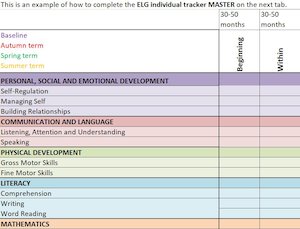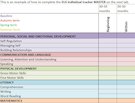Tracking progress in individuals and cohorts: a practice guide
- Recommended
Add to My Folder
Great tips on how to track progress in the EYFS and editable tracking spreadsheets!

Imagine that you are a good few weeks into the year and have completed your on-entry observations. Not only do you know where all of your children currently are in their learning journey, but you have also highlighted some cohort trends and patterns: it’s a job well done. Now comes the tricky part: you need to facilitate a whole year of learning that will open up opportunities for each child to learn, to explore the world around them, and, of course, make progress towards the all-important Early Learning Goals (ELGs). To do this, you need to have a system in place to track and record progress, and this is what we will explore in this article.
At this point, it is worth reminding ourselves of the difference between learning and progress. The former happens during a session or a day, while the latter happens over a longer period of time. By tracking both individuals and the cohort as a whole you will be able to see how they progress over time as well as highlighting planning needs and possible changes in your approach as a practitioner. But the process needs to be slick and requires careful consideration to make it effective.
Tracking systems available
The first question is which system will you choose? There are a wide range of approaches to tracking progress – many settings swear by the value of the more traditional sticky notes and tracking sheet approach (much like our attached tracker, or a LA tracker), while others are converts to the broad range of online systems available. Some widely used systems, such as Tapestry, garner widespread praise with the caveat that the analysis aspect of the program seems to baffle many practitioners. Other systems, such as 2Simple, Orbit and Capture Education have perhaps not received as glowing a report but nonetheless work well for many settings and are favoured by many. Both traditional and online systems have their strengths and weaknesses, but ultimately your system needs to work for you, your children and setting.
Already a member? Sign in below.
Published 17 November 2017
Reviews
You need to be signed in to place a review.

